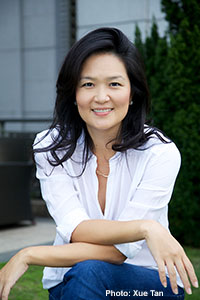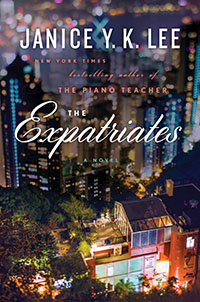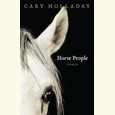The Desperate Housewives of Hong Kong
In Janice Y. K. Lee’s The Expatriates, Americans abroad learn to persevere
Janice Y. K. Lee’s new novel, The Expatriates, depicts the intersecting lives of three women, but the main character is Hong Kong itself, the place where they struggle to re-define themselves. Though the island-metropolis is massive and sprawling, the community of transplanted Westerners feels as incestuous as a medieval village: “Hong Kong is so small that if you go out enough, you will run into every expat at some point in the same five restaurants that people frequent,” one character observes, “The restaurants change, but the scene never does.”
 Two of the novel’s main characters, Margaret and Hilary, inhabit a world of comfort and privilege, and the third, Mercy, wants to get there. These real housewives of Hong Kong share tips on chauffeurs and private schools and meet at chic restaurants. Each new crop of women “sized one another up” according to critical “signifiers”: “Are you wearing Dansko clogs or Jimmy Choo mules, are you a salon blonde or do you leave your hair in a ponytail, do you live in jeans or gym clothes or are you always in a suit?”
Two of the novel’s main characters, Margaret and Hilary, inhabit a world of comfort and privilege, and the third, Mercy, wants to get there. These real housewives of Hong Kong share tips on chauffeurs and private schools and meet at chic restaurants. Each new crop of women “sized one another up” according to critical “signifiers”: “Are you wearing Dansko clogs or Jimmy Choo mules, are you a salon blonde or do you leave your hair in a ponytail, do you live in jeans or gym clothes or are you always in a suit?”
At their boutique exercise studios and high-end retail shops, the women interact with elite representatives of Europe and America and wonder aloud, “Where are the Chinese people?” When they travel elsewhere in Asia on holiday, this disparity becomes even more pronounced. Lee writes that “trips to islands where the average annual wage is the cost of a pair of expensive Italian shoes cast the Western expatriate in the role of ruler. The locals are feudal servants, running to obey every whim.”
Lee could play this conceit entirely for socio-political commentary and use the characters as targets for easy satire. Instead The Expatriates explores the women’s emotional traumas and their attempts to rebuild lives in the wake of upheaval. Having suffered an unspeakable loss, Margaret is in the ambivalent position of wanting to move on with her life but feeling guilty for leaving the past behind. Hilary, after a decade of marriage and a long tenure in Hong Kong, wants to adopt a child, though perhaps not with her roving husband. Mercy, a Columbia graduate and the daughter of Korean immigrants, came to Hong Kong on a whim but finds its elite society no easier to crack than New York’s. Alternately numb and self-loathing, she needs to find direction soon or risk an indefinite continuation of the rudderless floundering that has defined her twenties.
 To move forward, each of the women confronts her own inner demons. When she slips into solitary routines that offer a respite from the vicissitudes of family life, Margaret entertains fantasies about “her life as it might have been, if she had not married, if she had not had children.” Mercy also must overcome the after-effects of anguish and learn to see herself as the lead actor in her own life, not a walk-on forever subordinate to the headliners. Hilary, detached from her marriage and frustrated at her inability to conceive a child, creates an online persona, HappyGal, and begins occupying her free hours in Internet chat rooms. There she is free to become younger, blonde, active—anything other than the bored and restless housewife she has become.
To move forward, each of the women confronts her own inner demons. When she slips into solitary routines that offer a respite from the vicissitudes of family life, Margaret entertains fantasies about “her life as it might have been, if she had not married, if she had not had children.” Mercy also must overcome the after-effects of anguish and learn to see herself as the lead actor in her own life, not a walk-on forever subordinate to the headliners. Hilary, detached from her marriage and frustrated at her inability to conceive a child, creates an online persona, HappyGal, and begins occupying her free hours in Internet chat rooms. There she is free to become younger, blonde, active—anything other than the bored and restless housewife she has become.
Lee, who was born and raised in Hong Kong by Korean parents, frequently pauses to remark on the oddities of the expatriate experience. When foreigners first come to Hong Kong, they socialize with people from all over the world and do their best to imbibe local customs, but before long, she writes, they “tended to slip back into their national identities,” mostly because it offered the path of least resistance. Though women in Hilary’s position want to become true cosmopolitans, “You found yourself somehow more American than ever.” Margaret has also discovered, to her chagrin, that she naturally gravitated to her own “kind” and as a result in Hong Kong “became friends with the same people she would have known back in America.”
Lee concentrates her attention on the female characters, allowing the men to remain two-dimensional, background figures in the drama. When they appear in the novel, they typically misinterpret their wives’ emotional states and then drift back to the margins. It doesn’t help that many expatriate husbands succumb to the “Hong Kong curse”: from “an egalitarian American society,” where a man shares domestic duties, he moves to “a place where women cater to his every desire,” and soon the subservience of Asian women infiltrates his expectations at home. Unsurprisingly, Lee writes, Hong Kong’s “rental buildings are littered with the ghosts of ruined marriages.”
In The Expatriates, a follow-up to her bestselling 2008 novel, The Piano Teacher, Janice Y. K. Lee uses the experience of exile in Hong Kong, with the attendant estrangement and social pressure, to reveal her characters’ true natures, most often by exposing their weaknesses. No longer surrounded by their customary American culture, where they can conceal disappointment behind a welter of familiar customs and cliques, they are forced to confront the vulnerability of their fabricated lives. In this way, Lee’s novel offers an allegory for the precarious nature of existence: how many steps is anyone from ill fortune? After seeing an old acquaintance completely transformed after a divorce, Hilary sees that sometimes a cataclysm is what it takes to discover one’s identity: “When everything you thought was yours was taken away, and the foundation of your life shifted so that you have to start from zero, you might find out who you really are.”

Sean Kinch grew up in Austin and attended Stanford University as an undergraduate. He earned a Ph.D. in modern fiction from the University of Texas. He now teaches English at Montgomery Bell Academy in Nashville.


